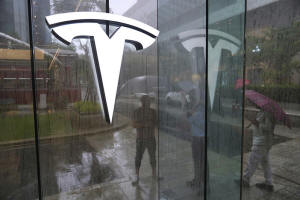Tesla debuts in India, but its cars likely cost too much for most
Indians
[July 16, 2025] By
RAJESH ROY
NEW DELHI (AP) — Tesla Inc. opened its first showroom in India on
Tuesday, marking the electric vehicle maker’s long-anticipated debut in
the world’s third-biggest automotive market.
Located in the Bandra-Kurla Complex, an upscale business center in the
financial capital Mumbai, the showroom will serve as Tesla’s flagship
retail and experience outlet as the company introduces its EV lineup to
Indian customers.
Tesla’s entry to India comes after years of delays and policy friction,
marking a pivotal expansion in a fast-growing consumer base while global
sales are plunging and the company faces challenges in its two core
markets, China and the U.S.
Sales of Tesla electric cars fell sharply from April to June as boycotts
over Elon Musk’s political views continued keeping buyers away.
For India, Tesla’s entry signals rising investor confidence and
strengthens its move towards clean mobility, although Tesla’s higher
pricing is likely to make its cars unaffordable for most Indians.
The country’s nascent electric vehicle market made up a little more than
2% of total car sales last year. But the government wants to change that
and increase the electric vehicle share to 30% by 2030.
Tesla will begin by importing and selling its popular Y model cars in
India. The base price would be 6.78 million rupees ($79,089) for the
long-range, rear-wheel drive vehicle, according to a presentation by the
company during the showroom launch Tuesday. Delivery is expected to
start from the third quarter, Tesla officials said.

By comparison, the price tag is around $44,990 in the U.S without a
federal tax credit.
Tesla will compete mostly with German luxury carmakers such as BMW and
Mercedes Benz Group AG, and not budget Indian players like Tata Motors
Ltd. and Mahindra & Mahindra Ltd. The luxury car market makes up just
about 1% of total vehicle sales
The debut by American EV giant, however, would bring in world class
technology to the country, auto analyst Gaurav Vangaal said.
“With deeper local investments, Tesla can accelerate India’s EV
ecosystem, drive innovation and support the government’s goal of higher
EV penetration,” said Vangaal, an associate director with S&P Global
Mobility.
Prime Minister Narendra Modi’s government has wooed Tesla for years for
its global brand value and to boost the country’s clean energy
endeavors.
CEO Elon Musk invited Indians in April 2016 to preorder the upcoming
Tesla Model 3. Several customers placed an order but the cars never
arrived and the booking amount had to be refunded.
[to top of second column] |

Private security guards stand amidst rain outside India's first
Tesla showroom in Mumbai, India, Tuesday, July 15, 2025. (AP Photo/Rafiq
Maqbool)
 Despite his earlier enthusiasm, in
2019 Musk expressed concern in a post on his social media platform X
that import taxes could double prices of Tesla cars, making them
“unaffordable.”
Tesla pressed Indian authorities to cut import taxes on EVs, which
were up to 100%, to be able to test the local market. New Delhi,
however, wanted Tesla to set up manufacturing facilities so a
comprehensive policy could benefit all the players in the sector.
The dynamics changed after Modi and Musk met in the U.S. in February
during a state visit by Modi.
Barely a month later, India rolled out a new policy to woo the likes
of Tesla, reducing import taxes to 15% from 70% to 100% for EVs
priced cheaper than $35,000 as long the automaker committed to
building a factory in the country within three years.
Soon after, Musk announced he would visit India in April to meet
Modi. It was widely expected he would unveil Tesla’s plans to set up
manufacturing facilities and commit billions of dollars in
investments. But Musk cancelled the visit, citing “very heavy Tesla
obligations,” and travelled to China instead.
Since then, Tesla has conveyed it does not have an immediate
interest in manufacturing in India.
U.S. President Donald Trump has said it would be “unfair” to the
U.S. if Tesla builds a factory in India to circumvent that country’s
tariffs. India and the U.S. are currently negotiating a bilateral
trade agreement for greater market access and reducing tariffs on
most goods, including automobiles.
Besides bringing Tesla to India, Musk’s India ambition has been to
launch Starlink’s commercial internet services. The plan got a boost
recently after the company secured regulatory clearances.
Starlink now needs to secure telecommunications airwaves from the
government, which may take at least a couple of months, before the
services are formally launched.
___
Rafiq Maqbool in Mumbai contributed to this report.
All contents © copyright 2025 Associated Press. All rights reserved
 |